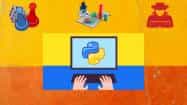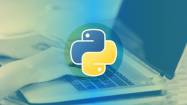Udemy Online Course Free Coupon Code
Python For Everybody: Five Domain Specialization
Game Development, Data Visualization, Web Scraping, Security and Cryptography, and Hacking–all at one course!
What you’ll learn
- Python basics like data-types, loops, decision-makings, file handling, libraries, modules, date-times etc.
- Create more than 10 real world projects
- Create a web scraper using BeautifulSoup and Selenium webdriver
- Python Advanced Concepts like functional programming, decorators, list comprehension, heapQ, Stacks etc.
- Famous python libraries: collection, datetime, pygame, numpy, pandas etc.
- Object oriented Programming and its features like: Inheritance, Polymorphism, Operator Overloading
- Game Development from scratch using turtle and pygame libraries
- Security and Cryptography: Message and Password Encryption and Decryption
- Data Visualization using numpy, pandas and matplotlib
- Hacking from scratch
- Using python to create Malware, Backdoor and Keylogger
Requirements
- Any machine with OS (Windows, MacOSX, and Linux)
- No programming background is essential (if there is, it will be useful)
- No prior knowledge of Python is required
- Fair internet connection is required to install some softwares and python libraries
Description
Welcome to Python Programming world: The most popular language skill to have in 2020. You are going to learn every bit of python language in this course so that you can apply your knowledge in real-world apps.
In this course, You will learn:
1. Web Scraping using BeautifulSoup and Selenium Webdriver
2. Game Development using Pygame module
3. Data Visualization using pandas, numpy and matplotlib module
4. Security and Cryptography
5. Hacking and Exploiting (Create Backdoors and Malware from Scratch)
TOPICS TO BE COVERED IN THIS COURSE:
Basic Python course Highlights:
- Installing Python
- Running Python Code
- Strings
- Lists
- Dictionaries
- Tuples
- Sets
- Number Data Types
- Print Formatting
- Functions
- Scope
- args/ kwargs
- Built-in Functions
- Debugging and Error Handling
- Modules
- External Modules
- Object-Oriented Programming
- Inheritance
- Polymorphism
- Encapsulation
- Advanced Methods
- Iterators
- Closures
- and much more!
Advanced Python Topic Highlights:
- Functional Programming (lambda, map, reduce)
- Decorators
- List Comprehensions, Dictionary Comprehensions
- HeapQ, Stack Implementation
- Classes and objects
- Metaclasses
Necessary Module covered:
- os
- collection
- random
- subprocess
- datetime
- math
- numpy
- pandas
- matplotlib
- beautifulsoup, selenium
- sqlite
- cryptodome
- turtle, pygame
- multiprocessing and so on…
PROJECTS SECTION
Projects (Basic to advance):
- Web scraping on real websites
- Snake game
- Dodge Car race game
- Pacman game
- Password and message hashing
- Cryptography
- NBA data visualization
- Making mac-changer with Python (Hacking)
- Malware from scratch
- Backdoor and Python Keylogger from scratch
Frequently Asked Questions:
Is Python A Good First Programming Language To Learn?
Even though it has not yet been adopted as a first language by many computer science programs, Python is widely seen by industry experts as a great first programming language when learning to code and its extensive use in SpaceX to automate and handle technologies to launch rockets, Instagram, Google to support their backends and Many companies to support and execute ML and Deep Learning Algorithms; Its undoubtedly No.1 Programming Language to learn.
For starters, the syntax of Python is simpler than that of most other major programming languages, with fewer exceptions and special cases. It also tends to use plain English keywords in place of the system of punctuation that has to be memorized in other languages, making it easier to learn to code. Given these conventions, Python code tends to appear as less of a “jumble” to newcomers than it does in comparable languages.
Another great feature of Python is the ubiquity of its use. While Python is optimized for development on Linux and Unix systems, interpreters are available for just about every major operating system. All implementations of Python are supported by an excellent standard library, which means that new students can very quickly move on to creating actual functional programs that are useful. Additionally, the standard implementation of Python, CPython, is free and open-source.
What Type Of Jobs Are Available To Python Programmers?
In the job market, if you observe the trends; Python is often looked like a strong language to support some primary language that is more broadly used like C or Java. But Lately, with the evolution of ML and Deep Learning Algorithms; it is highly demanded skill to have in 2020 and later. There are a variety of jobs that one can get focusing exclusively on Python development, however. Many of these jobs will be in building and improving the internal tools that a company uses to create its finished marketable products, rather than working on the finished product itself.
One specific economic sector where the presence of Python programming is particularly strong is the geospatial industry. This is a critical industry that deals with navigational tools such as GPS, radar, and light measurements.
If you’re interested in web applications, Python is a better choice for development (working with the back-end or server-side) rather than design (creating the actually finished front-end that site visitors interact with). As mentioned previously, Google employed Python for many components of its search engine, and it is quite widely used in the data mining industry.
Finally, Python can also be used for game development. Some famous examples of games developed either entirely or in large part with Python include EVE Online, Civilization IV, the Battlefield game series, and the Mount & Blade games. The popular development environment Blender is written in Python.
Author(s): Sachin Kafle



